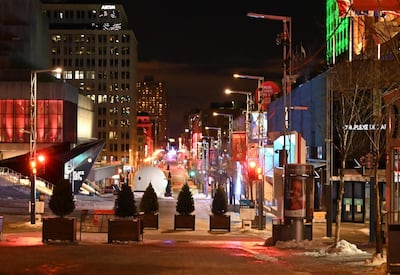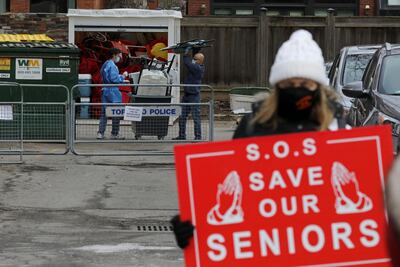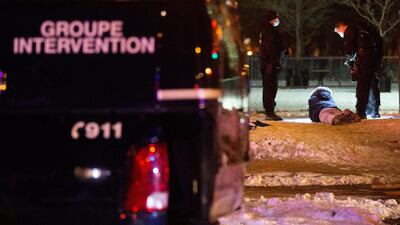Montreal, the city where I live, has gone into another lockdown. I’m not really sure if it’s the third or fourth or fifth – such is the oscillation in measures that have been introduced here over the course of the coronavirus pandemic. Schools close, shops and companies go in and out of business. The only constant is the sound of delivery vehicles bringing food, mail and the next impulse Internet purchase.
The lockdown is different this time, though, because it includes an unprecedented curfew from 8pm to 5am every day, presumably to put a halt to the night-time gatherings and parties trailing the holidays that are fuelling the record case numbers. Standing on the balcony at night is eerily silent. Even sounds in the distance are muted, as are footsteps by the accumulating snowfall.
The latest measures appear to enjoy widespread support – around 70 per cent, according to a recent survey – due to alarm over the record numbers of infections and hospitalisations in Canada as a whole, and the province of Quebec in particular, where wearing masks indoors in public facilities is mandatory. It is a welcome reminder that even as images of insanity stream from south of the border in the US, people here are generally quite reasonable. They want to arrest this plague, even with the end in sight as vaccines are rolled out.

What the public in Canada appears not to have is patience for the hijinks of its elected politicians. Over the past three weeks, several Canadian officials, particularly in Ontario and Alberta, have been forced to resign after taking vacations abroad. Rod Philips, Ontario’s finance minister, resigned after an embarrassingly incompetent online sleuthing effort to cover the tracks of a trip he took to the Caribbean island of St Barts. He went so far as to film a video of himself next to a decorated gingerbread house and a glass of eggnog, wearing a jumper ostensibly to express solidarity with Canadians who spent Christmas in the cold, away from their families.
Tracy Allard, Alberta's municipal affairs minister, and a crucial cog in its vaccine strategy, was similarly forced to resign after she was revealed to have vacationed with her family in Hawaii.
The examples of ministers caught red-handed flying off to winter in warmer climes are almost farcical, were it not for the fact that less well-off people are suffering so disproportionately. I am lucky because I work from home, can afford childcare, can order groceries delivered and can substitute in-person interaction for Zoom meetings without much adverse effect beyond what everyone else is struggling with – the mental health challenges of confinement and isolation coupled with the absence of family and loved ones.
But my lifestyle is made possible by the sacrifices of essential workers, such as Uber Eats delivery workers, doctors, nurses, rubbish collectors, grocery store employees, UPS drivers, factory workers at meatpacking plants, Amazon warehouse employees, mail carriers and many others. And we have failed them, in Canada and elsewhere, leaving them to suffer disproportionately. An investigation in December by the Toronto Star, an Ontario daily, showed that over 7,600 workers had been infected with Covid-19 on the job across that province, but just two fines had been issued by the provincial labour ministry. One of the fines was handed to a worker rather than an employer. Employers have been lax at enforcing guidelines on social distancing and other safety measures to protect these workers. One beef-processing plant in Alberta had an enormous outbreak of over 1,000 cases.

These facts make travel by the same officials who urged people to stay home for Christmas a bit less funny. The frustration is compounded by the inexplicably slow vaccine rollout. Canada bought enough vaccine doses from various suppliers, including Pfizer-BioNTech and Moderna, to vaccinate the entire population several times over, and officials say they are on track still to do so by the fall of 2021.
But the rollout has been slow, to put it charitably, largely because it is in the hands of individual provinces. While Israel and the UAE have led the world in vaccination, inoculating 22.2 per cent and 12.9 per cent of their populations, respectively, Canada has so far managed to vaccinate 0.9 per cent of the population. The lack of alacrity contrasts sharply with the urgency of the crisis, despite Canada having had so long to plan for it.
The pandemic has tested humanity more than anything in recent memory. In the past few weeks, the initial hope offered by vaccines morphed into dread and then resignation to the fact that we in Canada have months still before we get through this tunnel. In poorer countries who cannot afford to purchase millions of doses, coming out the other side may take years. We all still have a way to go.
Perhaps as we contemplate our eventual release back into normality, a life without masks and with hugs, we ought to remember once again that the option of isolating or sheltering at home is made possible only by the sacrifices of thousands of people who do not have that option. We owe them an incalculable sum that must be reflected in their wages, benefits, mental health care and our collective gratitude. These are all measures that Canada has so far failed to introduce. But they are as crucial to the country's health as any others.
Kareem Shaheen is a veteran Middle East correspondent in Canada and a columnist for The National


